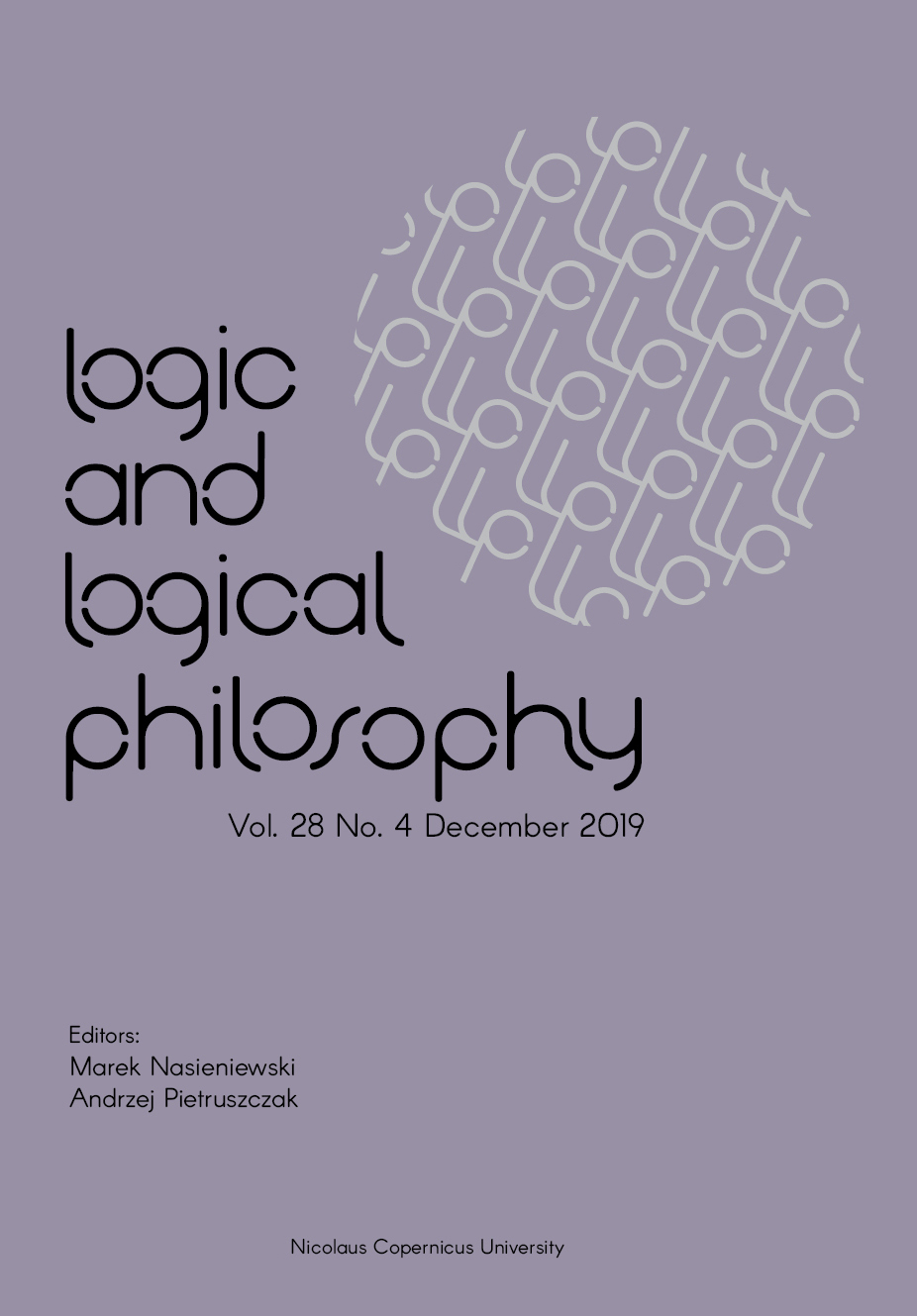Logic in the Land of Make-Believe
DOI:
https://doi.org/10.12775/LLP.2019.017Keywords
abstraction, interpretation, contagion, pretenseAbstract
Philosophers call it “contagion” when pretense influences belief, behavior, perception, or emotion. This pejorative terminology is justified in some cases: fantasy and imagination can exercise a pathological influence. This essay, however, reviews some logical techniques that allow pretense to govern belief in a rational and beneficial way. Philosophers might want similar techniques in their tool-kits when they explore interactions between belief and pretense.
References
Angelelli, I., “Adventures of abstraction”, Poznan Studies in the Philosophy of the Sciences and the Humanities 82 (2004): 11–35.
Bonevac, D.A., Reduction in the Abstract Sciences, Hackett, Indianapolis, 1982.
Burgess, J.P., Fixing Frege, Princeton University Press, Princeton, New Jersey, 2005.
Dewey, J., Art as Experience, Minton, Balch and Company, New York, 1934.
Gendler, T.S., “On the relation between pretense and belief”, pages 125–141 in D.M. Lopes and M. Kieran (eds.), Imagination, Philosophy and the Arts, Routledge, London, 2003. DOI: http://dx.doi.org/10.1093/acprof:oso/9780199589760.003.0008
Gendler, T.S., “Imaginative contagion”, Metaphilosophy 37, 2 (2006): 183–203. DOI: http://dx.doi.org/10.1111/j.1467-9973.2006.00430.x
Gendler, T.S., “Imagination”, In E.N. Zalta (ed.), The Stanford Encyclopedia of Philosophy, plato.stanford.edu, 2013.
Leeuwen, N.V., “The meanings of “imagine”, part II: Attitude and action”, Philosophy Compass 9, 11 (2014): 791–802. DOI: http://dx.doi.org/10.1111/phc3.12141
Lorenzen, P., “Equality and abstraction”, Ratio 4 (1962): 85–90.
Lorenzen, P., Formal Logic, D. Reidel, Dordrecht-Holland, 1965.
Mancosu, P., “Grundlagen, Section 64: Frege’s discussion of definitions by abstraction in historical context”, History and Philosophy of Logic 36, 1 (2015): 62–89. DOI: http://dx.doi.org/10.1080/01445340.2014.967950
Pasch, M., “Die Begründung der Mathematik und die implizite Definition: Ein Zusammenhang mit der Lehre vom Als-Ob”, Annalen der Philosophie 2 (1921): 145–162.
Pasch, M., “Implicit definition and the proper grounding of mathematics”, pages 95–107 in S. Pollard (ed.), Essays on the Foundations of Mathematics by Moritz Pasch, chapter 4, Springer, New York, 2010. DOI: http://dx.doi.org/10.1007/978-90-481-9416-2_5
Pollard, S., “What is abstraction?”, Noûs 21, 2 (1987): 233–240. DOI: http://dx.doi.org/10.2307/2214916
Pollard, S., “Weyl on sets and abstraction”, Philosophical Studies 53 (1988): 131–140. DOI: http://dx.doi.org/10.1007/bf00355680
Pollard, S., Philosophical Introduction to Set Theory, University of Notre Dame Press, Notre Dame, Indiana, 1990.
Pollard, S., “‘As if’ reasoning in Vaihinger and Pasch”, Erkenntnis 73 (2010): 83–95. DOI: http://dx.doi.org/10.1007/s10670-009-9205-7
Pollard, S., A Mathematical Prelude to the Philosophy of Mathematics, Springer, New York, 2014. DOI: http://dx.doi.org/10.1007/978-3-319-05816-0
Quine, W.V.O., From a Logical Point of View, Harvard University Press, Cambridge, Massachusetts, 1980.
Scott, D., “More on the axiom of extensionality”, pages 115–131 in Y. BarHillel, E.I.J. Poznanski, A. Robinson, and M.O. Rabin (eds.), Essays on the Foundations of Mathematics, Hebrew University, Jerusalem, 1966.
Simons, P., “What is abstraction and what is it good for?”, pages 17–40 in A.D. Irvine (ed.), Physicalism in Mathematics, Kluwer, Dordrecht, 1990. DOI: http://dx.doi.org/10.1007/978-94-009-1902-0_2
Visser, A., “An overview of interpretability logic”, pages 307–359 in M. Kracht, M. De Rijke, and M. Zakhary (eds.), Advances in Modal Logic, volume 1, CSLI Publications, Stanford, CA, 1998.
Weyl, H., Philosophy of Mathematics and Natural Science, Princeton University Press, Princeton, New Jersey, 1949.
Downloads
Published
How to Cite
Issue
Section
Stats
Number of views and downloads: 519
Number of citations: 0







